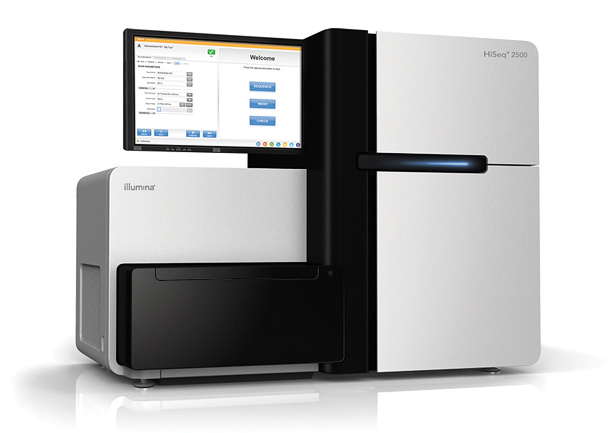Sick Babies Could Have Genomes Sequenced in Days

In a study that shows how whole-genome sequencing could be used in life-or-death medical situations involving newborns, researchers at a hospital in Kansas analyzed the entire genomes of seven babies that died near birth, accurately diagnosing five of them with critical conditions within about 50 hours each—fast enough to be meaningful to their care.
Currently, gene testing in neonatal intensive care units can take a month or more, time in which the parents are anxiously awaiting results and doctors are trying to decide how aggressively to treat a child who may have no future.
Though this use of sequencing would benefit only a small group—newborns with hard-to-diagnose single-gene disorders—it is a proof of principle that whole-genome sequencing is viable for treating patients in real-time at a realistic cost, says Stephen Kingsmore, the paper’s lead author and director of the Center for Pediatric Genomic Medicine at Mercy Hospital. The sequencing, conducted at Children’s Mercy Hospitals and Clinics in Kansas City, Missouri, cost about $13,500 per genome.
“For those of us who have been decoding genomes, it’s been phenomenally frustrating that, up until now, practical medicine has not benefited from whole-genome sequencing,” Kingsmore said during a telephone news conference Tuesday. “The significance of this [study] is pretty straightforward. We can now consider whole-genome sequencing to be relevant for hospital medicine.”
Technology is no longer the limiting factor in whole-genome sequencing, says Mark J. Daly, codirector of medical and population genetics at the Broad Institute in Cambridge, Massachusetts. The primary challenge now is making sense of the reams of data produced by the sequence.
“The machines are great, the technology is great. We don’t quite know what to do with the information,” says Daly, who is also affiliated with Massachusetts General Hospital and Harvard Medical School. “But we’re learning.”
The Mercy researchers addressed this issue by narrowing the field of candidate genes. They looked at the 600 or so most likely to carry crucial mutations, and developed a database to link symptoms to those disorders. They eventually intend to expand their search to all 3,500 known disease genes.
“The first question is, what gene should we be looking at?” says Neil Miller, director of informatics at the Center for Pediatric Genomic Medicine at Mercy Hospital and a coauthor on the paper. “The second important question is, what effect might each of the variants that we detected in each patient have on the gene that it occurs in?”
Miller developed a software program that scored gene variants based on how likely they were to have caused the child’s disease. That combination narrowed the search down to a handful of variants that could then be looked over by a doctor to make a diagnosis.
The babies in the study were either desperately ill or stillborn and all died, but genome sequencing could, in some cases, allow doctors to perform life-saving treatments in the future.
The families involved in the study still learned important information from the genetic analysis, says Carol Saunders, clinical lab director at Mercy Hospital and a coauthor. One family found that its other, healthy children might be carriers of an extremely rare and lethal form of epilepsy; another learned that their baby’s mutation was not inherited, so they would likely have better success with a future pregnancy; and in a third family, researchers identified the mutation that caused them to lose two other babies. That family can now undergo pre-implantation genetic screening to ensure that their next baby won’t have the mutation.
Mercy Hospital expects to have its own genetic sequencing setup within a month or so, and will offer other hospitals access to its analysis shortly after that, Kingsmore says.
David T. Miller, assistant director of the genetic diagnostic laboratory at Boston Children’s Hospital, praised the research from a technological and logistical standpoint, but says he wonders exactly how useful it will be. Most medical decisions in the neonatal intensive care unit don’t hinge on a two-day versus a one-month genetic analysis, and other patients won’t be easy to diagnose even with a whole-genome sequence, says Miller, who wasn’t involved in the research. “I guess it all is going to come down to what’s the cost for it going to be compared to [the] benefit, and will it balance out?” he says.
Daly says the potential benefit of rapid whole-genome sequencing is so high that it’s worth doing even if the technology is not optimized yet. “Even if it only succeeds one time in 100, you can’t really put a price on that,” Daly says.
Keep Reading
Most Popular
Large language models can do jaw-dropping things. But nobody knows exactly why.
And that's a problem. Figuring it out is one of the biggest scientific puzzles of our time and a crucial step towards controlling more powerful future models.
How scientists traced a mysterious covid case back to six toilets
When wastewater surveillance turns into a hunt for a single infected individual, the ethics get tricky.
The problem with plug-in hybrids? Their drivers.
Plug-in hybrids are often sold as a transition to EVs, but new data from Europe shows we’re still underestimating the emissions they produce.
Google DeepMind’s new generative model makes Super Mario–like games from scratch
Genie learns how to control games by watching hours and hours of video. It could help train next-gen robots too.
Stay connected
Get the latest updates from
MIT Technology Review
Discover special offers, top stories, upcoming events, and more.